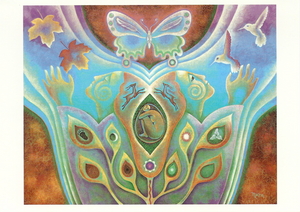 The Yogabliss on-line Moving into Meditation class met this morning. Thanks to every one of you who bring your presence and feel the truth of what’s happening in ourselves, our community and our society. So many of us are heavy hearted – literally breathing in smoke – and also witnessing the destruction of the many kinds of fire burning in our communities. Today we explored how to cultivate equanimity and compassion. – Meditation teacher Gil Fronsdal describes equanimity as being centered in the middle of change, to see with patience and understanding. Equanimity is the protector of compassion and love.
The Yogabliss on-line Moving into Meditation class met this morning. Thanks to every one of you who bring your presence and feel the truth of what’s happening in ourselves, our community and our society. So many of us are heavy hearted – literally breathing in smoke – and also witnessing the destruction of the many kinds of fire burning in our communities. Today we explored how to cultivate equanimity and compassion. – Meditation teacher Gil Fronsdal describes equanimity as being centered in the middle of change, to see with patience and understanding. Equanimity is the protector of compassion and love.
We drew on the teachings of Thich Nhat Hanh, often referred to as Thay or teacher, and his student Cheri Maples. Thay is sometimes called the “father of mindfulness.” Martin Luther King nominated the Vietnamese Zen Master for a Nobel Peace Prize in 1967. You can read more about his life’s work as a peace activist in the 2019 Time article, The Monk Who Taught the World Mindfulness Awaits the End of This Life.
 Cheri served in the criminal justice system for over 25 years. After meeting Thay, she became a meditation teacher and together they introduced mindfulness to the police officers of Madison, Wisconsin. After listening to her 2015 talk on social engagement I got some practical insight into how to cultivate equanimity in my daily life. Days after hearing her caring voice, I learned of her 2017 passing from complications of injuries sustained in a traumatic cycling accident. I didn’t know Cheri personally and I feel her loss deeply. We need caring, practical, loving voices like hers now more than ever.
Cheri served in the criminal justice system for over 25 years. After meeting Thay, she became a meditation teacher and together they introduced mindfulness to the police officers of Madison, Wisconsin. After listening to her 2015 talk on social engagement I got some practical insight into how to cultivate equanimity in my daily life. Days after hearing her caring voice, I learned of her 2017 passing from complications of injuries sustained in a traumatic cycling accident. I didn’t know Cheri personally and I feel her loss deeply. We need caring, practical, loving voices like hers now more than ever.
We were also inspired by the transformational poems of Naomi Shihab Nye. Naomi was born to a Palestinian father and American mother. She grew up in Missouri, Jerusalem and Texas. Her poems, Cross That Line and Two Countries invite our creative imagination and empathy to reach past differences and to go to places larger than ourselves.
 Cross That Line was inspired by singer, actor, athlete, scholar and political activist, Paul Robeson. On May 18, 1952 he performed an outdoor concert for more than 25,000 people (estimates range as high as 45,000) gathered on both sides of the United States/Canadian border at Peace Arch Park in Blaine. He sang from a platform on the back of a truck. His passport had been confiscated by the State Department after he refused to sign an affidavit stating he was a communist. He sang in English, songs of peace in Russian and Chinese, songs of liberty in a tongue of the African villages. Despite the racially and politically charged struggle in which Robeson was engaged at the time of this concert, the event was unmarred by violence.
Cross That Line was inspired by singer, actor, athlete, scholar and political activist, Paul Robeson. On May 18, 1952 he performed an outdoor concert for more than 25,000 people (estimates range as high as 45,000) gathered on both sides of the United States/Canadian border at Peace Arch Park in Blaine. He sang from a platform on the back of a truck. His passport had been confiscated by the State Department after he refused to sign an affidavit stating he was a communist. He sang in English, songs of peace in Russian and Chinese, songs of liberty in a tongue of the African villages. Despite the racially and politically charged struggle in which Robeson was engaged at the time of this concert, the event was unmarred by violence.
Continue reading →
 The Yogabliss, Two Rivers/River Tree Yoga on-line Moving into Meditation classes met this morning. Thank you for coming to practice today. We explored ways of experiencing gratitude in our hearts – receiving it like a gift. It’s an emotion that feels good like holding a sleeping baby or stroking the silky back of your cat or your dog’s ears. Ordinary things that nourish us quietly without a lot of effort. It’s the solace that’s present beneath the noise of disheartening news. I guess you could say it’s an inner and outer resource.
The Yogabliss, Two Rivers/River Tree Yoga on-line Moving into Meditation classes met this morning. Thank you for coming to practice today. We explored ways of experiencing gratitude in our hearts – receiving it like a gift. It’s an emotion that feels good like holding a sleeping baby or stroking the silky back of your cat or your dog’s ears. Ordinary things that nourish us quietly without a lot of effort. It’s the solace that’s present beneath the noise of disheartening news. I guess you could say it’s an inner and outer resource.




